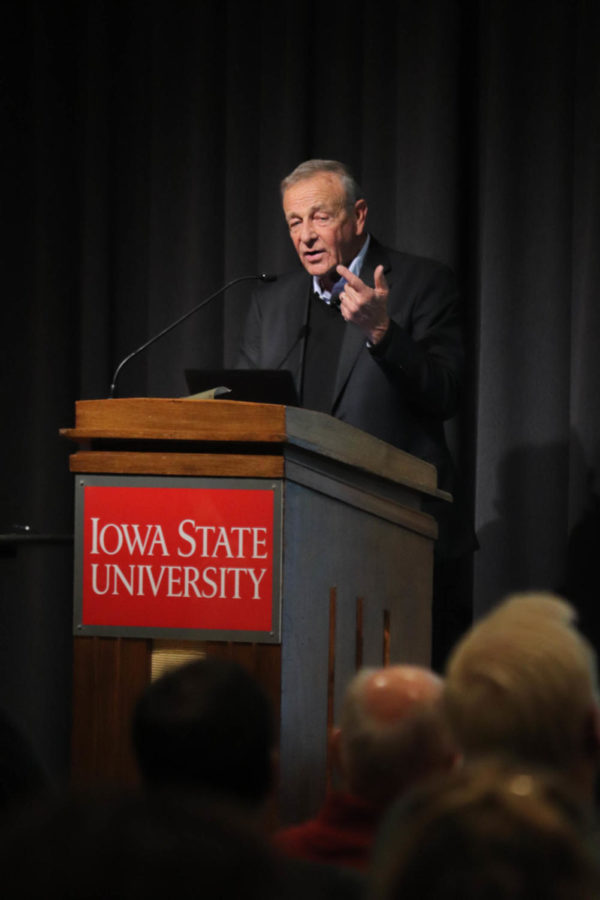Bon Appétit restaurant company owner discusses the importance of sustainability
Grant Tetmeyer/Iowa State Daily
Bon Appetit cofounder talks to a group in the Sun Room about the food industries impact on the world on Mar. 27. He addressed issues from sustainability to worker rights in crop fields.
March 27, 2019
Fedele Bauccio came to Iowa State Thursday night from San Francisco to discuss the sustainable food company called Bon Appétit he started 32 years ago.
Coming from the restaurant side of the business, Bauccio moved to the contract side to develop a chef-driven food service that creates food that is “alive with flavor,” while still being fresh.
“I was appalled at what was going on on college campuses — food out of a can, out of a box, frozen … it just bothered me,” Bauccio said.
Bauccio said he wanted to do something that has never been done before and create not a contract company, but a restaurant company.
With this dream, comes the dream of making the contract side of it better.
Instead of a mission statement for the company he created, Bauccio created a dream, hoping it would create an emotional attachment and leading to a real change.
Bauccio’s dream was to “become a restaurant company known for culinary expertise,” while also committing to responsible practices.
He also wanted “to create food that was alive with flavor and nutrition prepared from scratch using authentic ingredients,” Bauccio said.
This last sentence was added years later to ensure that the company is providing food sourced from “farm-to-fork.”
This kind of company sources food to other companies, schools and restaurants to then sell to customers. His idea took this further by providing food sourced sustainably.
Bauccio created his own definition for “sustainable.” Bauccio’s definition of sustainable is “healthy and flavorful food … that is economically viable for all, needs to be produced though practices that respect our farmers, workers, and animals, nourish the community, and replenish our shared natural resources for future generations.”
In order for the food coming to and from Bon Appétit to be sustainable, there are four main aspects that are required.
One is meat products need to be antibiotic free. Bauccio said that 80 percent of the meat sold in grocery stores are filled with antibiotics used solely to bring the animal to be sold faster, not to heal from sickness
With the rise of antibiotic resistance occurring in human populations throughout the globe, eating food with more antibiotics will not help the issue.
The second is selling animal products that are humanely raised. Generally, most factory farms do not provide their animals with humane living environments, Bauccio said.
A humane living environment would be giving the animals the ability to perform natural behaviors in a cage-free, roam-free environment according to Bauccio.
The third is known as the “seafood watch.” This is understanding what seafood can be sourced sustainably without going extinct due to human reasons. Bauccio said there are no sustainable salmon in the United States.
Bauccio said that the majority of farmed salmon is injected with dyes and antibiotics and are raised in small cages.
“Never eat farmed salmon … [when you eat farmed salmon] you ingest that,” Bauccio said.
The last is farmworkers’ rights. Bauccio went into detail about a tomato field in Florida not that long ago that he described as slavery.
People were locked up because they weren’t working hard enough,” Bauccio said. “I saw child labor issues. I saw sexual discrimination in the field. I saw no bathrooms, no shade, no water.”
Bauccio said the workers looked like they were working extremely hard, but according to those in charge, it was not fast enough.
After exposing this to the media and a six-month boycott on tomatoes, the company saw some changes.
So where does the food business go from here? Bauccio said the food business is going plant-based.
“It’s about trying to move a model of agriculture that’s broken to more of an ecological model,” Bauccio said. “A model that is environmentally sound … economically viable for everybody, not just those people that can afford to go to Whole Foods, and socially equitable.”
This idea is moving away from animal products and using plan based products to make food that tastes great while also giving all the nutrients a person needs, Bauccio said.
One example is the “impossible burger,” a burger created entirely of plants that looks and tastes like its meaty competitor. Brought up by a audience member during the question portion of the night, the impossible burger can be found at Brick City Grill here in Ames. It is listed as “Veggie Burger” on the menu.







